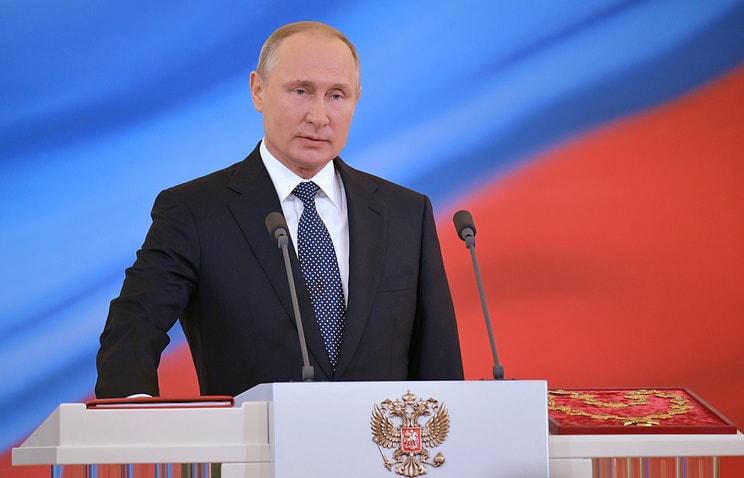Trump turns his back on his predecessor's legacy; Syria war heats up again
(Baonghean.vn) - The world last week witnessed many surprising developments that had a significant impact on international relations, such as the US President's withdrawal from the Iran nuclear deal, the missile attack between Israel and Iran in Syria, the location of the US-North Korea summit, Putin's re-election as Russian President, etc.
1 - Mr. Putin was sworn in as President of Russia
 |
| Russian President Vladimir Putin was sworn in on the afternoon of May 7. Photo: TASS |
On May 7, Mr. Vladimir Putin was sworn in as President of the Russian Federation at the Andreev ballroom of the Great Kremlin Palace in Moscow, beginning his six-year term as President, until May 7, 2024.
In the presidential election last March, he won a record 76.7% of the vote. In 2000, the figure was 52.94%, in 2004 it was 71.31% and in 2012 it was 63.6%.
At the inauguration ceremony, Putin emphasized that Russia needs to become more modern and dynamic, strongly facing new challenges of the times, because "the flow of history does not allow us time for relaxation, complacency, and indifference."
According to Putin, Russia needs to make breakthroughs in all areas of life. To do this, it needs the cooperation and consensus of the whole society.
The Russian leader stressed that criteria such as reputation, honor, public service, and openness will be the standards for evaluating authorities in the new era.
In his speech, Putin said that relying on the “boldness” of youth, the future leaders of the country, is the way he will approach and promote in his next term.
Security and defense issues will continue to be maintained, upheld, and receive more attention in the coming time.
2 - US withdraws from historic nuclear deal
 |
| Iran's nuclear dossier remains a source of US-Iran tension. Photo: Getty |
On May 8, President Donald Trump officially announced that the US would withdraw from the Iran nuclear deal and re-impose economic sanctions on the Islamic Republic. This move was considered by many to be a “serious mistake”, threatening to put the agreement, which had taken much effort to achieve under his predecessor Barack Obama, at risk of returning to its original starting point. Despite their disappointment, US allies in Europe; the UK, France and Germany are still committed to continuing to implement the nuclear deal with Iran.
Meanwhile, two other allies in the Middle East, Israel and Saudi Arabia, consider this a "historic" step to prevent Iran from possessing nuclear weapons and have expressed their willingness to cooperate with the US to resolve this issue.
According to analysts, the US's unilateral decision could push the Middle East into a new spiral of tension as Iran threatens to resume its nuclear programs.
3 - Israel-Iran tensions escalate in Syria
 |
| The Israeli army hit dozens of Iranian military targets in Syria at midnight. Photo: AP |
On May 10, Syria's state news agency SANA said the country's air force was deployed to prevent an Israeli missile attack allegedly carried out by Israeli warplanes from Lebanese airspace.
The Israel Defense Forces (IDF) later confirmed that the Israeli military was continuing to strike “Iranian targets” in Syria, warning that any retaliatory action by Syrian forces would be “extremely serious.” This was seen as a response to what Israel claimed were about 20 missiles launched by Iran’s Quds Force from Syrian territory at night towards the Israeli-controlled Golan Heights.
Speaking to the press, an Israeli representative stressed that the country did not seek to escalate tensions, and affirmed that it had notified Russia in advance about its airstrikes on many targets in Syria.
Condemning the actions of its opponents, Iran called Israel's attacks on Syria "an act of aggression", based on "made-up and baseless pretexts", while the whole world remained silent, which meant "giving the green light" to Israel.
4 - US-North Korea Summit "finalizes" time and location
 |
| US President Donald Trump and North Korean leader Kim Jong-un. Photo: AFP |
On May 10, the US President posted on his personal Twitter page: “The highly anticipated meeting between Kim Jong-un and myself will take place in Singapore on June 12. We will work together to make it a very special moment for World Peace!”
Singapore is said to have three important conditions to be chosen as the venue for the high-level dialogue between the US and North Korea: experience in organizing many high-level international conferences; close relationship with the US and security assurance capacity; one of the countries that has diplomatic relations with North Korea and hosts its embassy.
The announcement came a day after North Korea released three imprisoned Americans during Secretary of State Mike Pompeo's latest visit to Pyongyang, marking the first meeting in history between a sitting US president and the North Korean leader.
Still, Mr Trump struck a cautiously optimistic tone when discussing the prospects of reaching a deal at his upcoming summit with Mr Kim, saying he hoped a historic accord could be negotiated while also warning that the talks might not yield “sweet fruit”.
5 - Malaysia has the world's oldest new prime minister
 |
| New Malaysian Prime Minister Mahathir Mohamad. Photo: AFP. |
On the evening of May 10, in a ceremony presided over by King Muhammad V, Mr. Mahathir Mohamad was sworn in as Prime Minister of Malaysia for a new term. According to the election results on May 9, former Prime Minister Mahathir Mohamad won a historic victory, ending 60 years of rule by the Barisan Nasional coalition.
Mahathir, 92, became the world's oldest prime minister after his Pakatan Harapan (PH) coalition won more seats in the general election. PH won a total of 121 of the 222 seats in parliament, while Prime Minister Najib Razak's Barisan Nasional (BN) coalition won only 79 seats.

